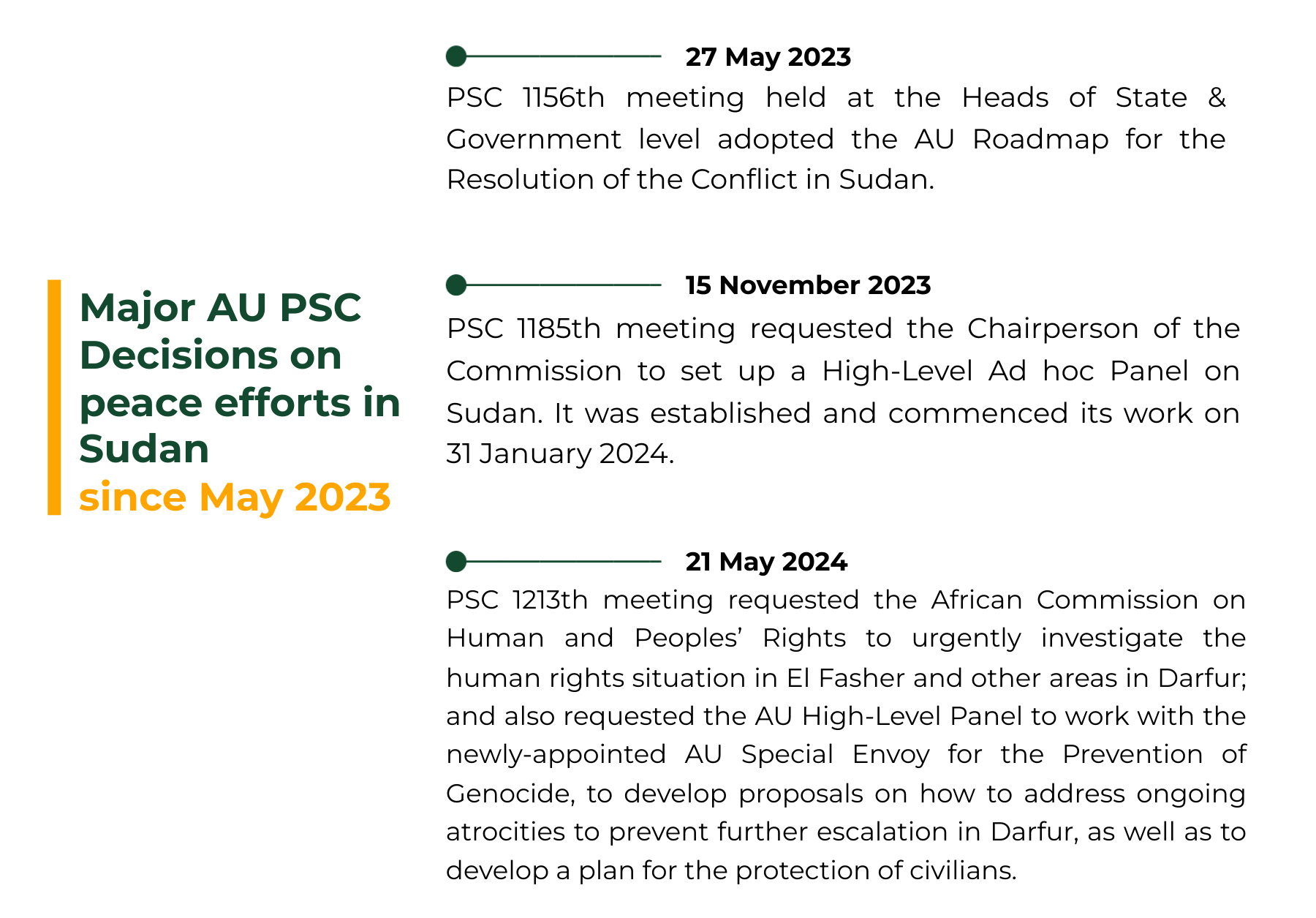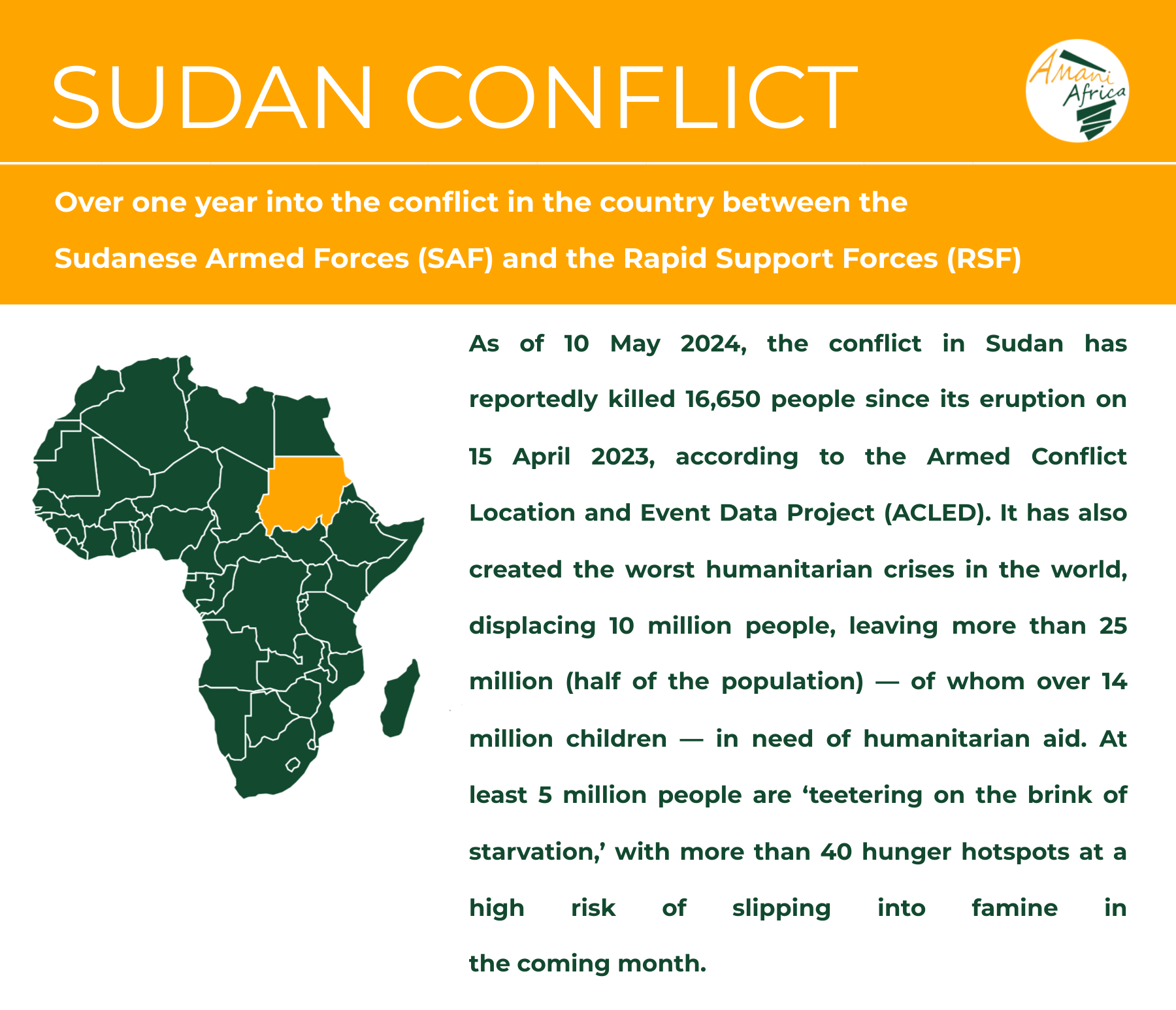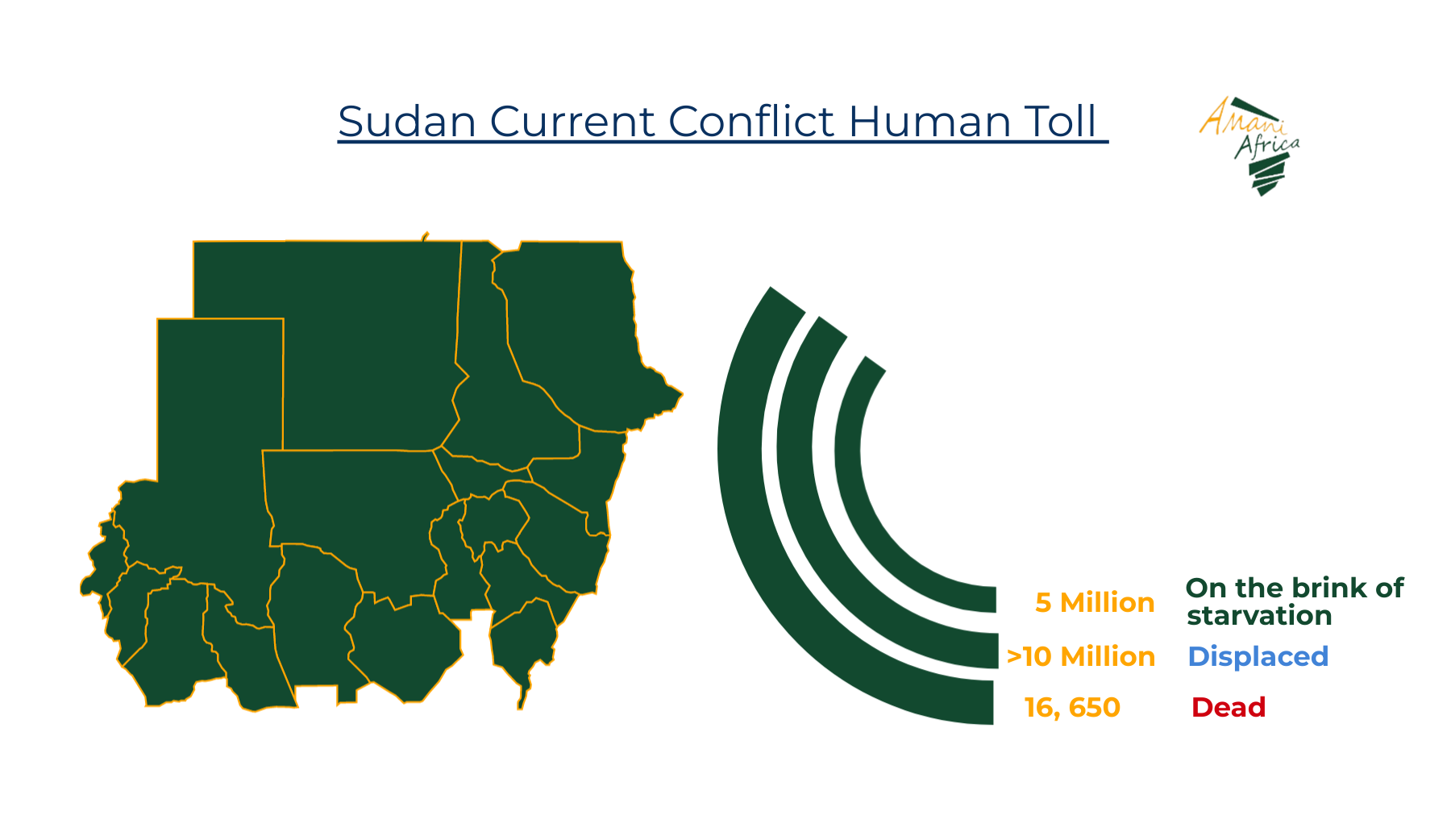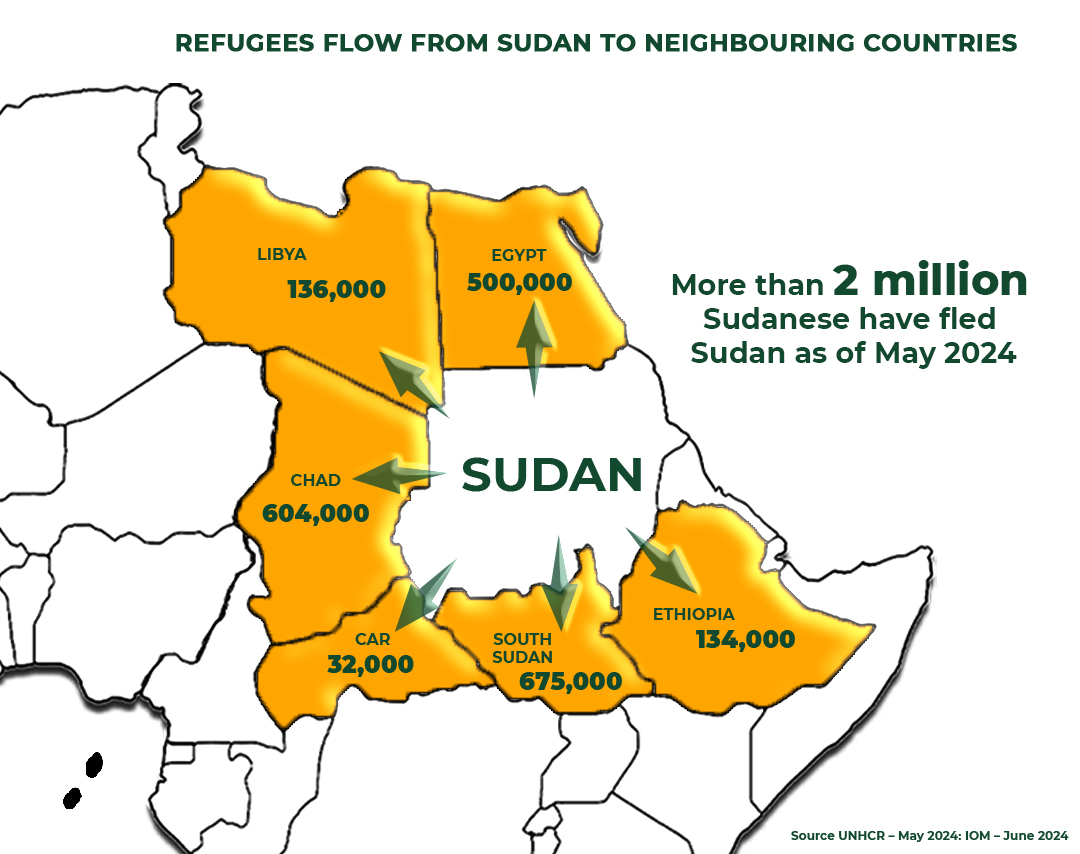Consideration of the situation in Sudan
Date | 20 June 2024
Tomorrow (21 June), the African Union (AU) Peace and Security Council (PSC) is expected to convene its 1218th session at the level of Heads of State and Government to consider the situation in Sudan. This will be the second time Uganda has convened a summit-level session on Sudan during its chairship of the PSC since the conflict erupted in April 2023, the first being held last year in May.
Uganda’s President and chairperson of the PSC for the month of June, Yoweri Kaguta Museveni, is expected to preside over the session. The Chairperson of the AU Commission, Moussa Faki Mahamat, and Mohamed Ibn Chambas, the chair of the AU High-Level Panel on Sudan and High Representative for Silencing the Guns, are expected to brief the PSC. António Guterres, Secretary-General of the United Nations (UN), Workneh Gebeyehu, Executive Secretary of the Intergovernmental Authority on Development (IGAD), and Ahmed Aboul Gheit, Executive Secretary of the League of Arab States (LAS) are also anticipated to deliver statements.
Tomorrow’s session is expected to discuss the state of the stalling regional and international diplomatic efforts to end the conflict. It is likely that the PSC will hear from the High-Level Panel on the efforts to the convening of an ‘all-inclusive inter-Sudanese dialogue.’ As per a briefing note prepared for the 1209th session, the Panel has developed a three-pronged approach to address the situation in Sudan: shuttle diplomacy with various stakeholders to mobilise support; enhanced coordination with partners and regional organisations to consolidate mediation efforts and avoid duplication; and convening an inclusive inter-Sudanese political dialogue focusing on ending the conflict and charting a course for the future of the country.
This dialogue, intended to complement the Jeddah Process, is envisaged to proceed in two phases: the planning phase and the main phase. The planning phase is expected to address a variety of issues that will set the tone for the main phase, including the categories of entities or individuals to be invited, quotas of representation, agenda, structure of management of the dialogue, venue, date, funding and logistics, and the role of the international community. Since its last update to the PSC, a major development that the Panel is expected to highlight concerns its plan for holding a preparatory meeting. The Panel has sent out invitations to Sudanese civilian forces for a preparatory meeting to be held on 10-15 July 2024 that is meant to pave the way for the convening of ‘all-inclusive inter-Sudanese Dialogue’. Some of those who received the invitation are sounding alarm that there was no adequate consultation such as on the invitation extended to the representatives of the Sudanese Armed Forces (SAF).
One of the challenges for the peace process in Sudan is the plethora of initiatives for peace, with overlapping, if not competing, engagements and initiatives. Apart from spreading thinly diplomatic resources and giving rise to ‘forum shopping,’ the diversity of, and at times competing, initiatives are undermining the effectiveness of regional and international engagements. Apart from the proposed preparatory meeting in Addis Ababa scheduled to begin on 9 July, for which the AU Panel sent out invitations, it is reported that a conference for Sudanese political forces is expected to be hosted in Egypt at the end of June 2024.
Despite expectations for the resumption of the Jeddah process with expanded participation of key regional actors, it remains in abeyance with facilitators not getting a commitment for decisive negotiation from both parties. On his part, the UN Special Envoy for Sudan, Ramtane Lamamra, has continued with his consultations including for the convening of the major actors involved in peace efforts in Sudan including on how to enhance coordination and joint efforts. The only notable recent international convening for peace on Sudan was concluded on 12 June 2024 in Cairo, Egypt hosted by the LAS. The consultative meeting was attended by, among others, representatives of AU, UN, IGAD, the European Union (EU), the Kingdom of Bahrain, the Islamic Republic of Mauritania and the Republic of Djibouti, in which it concluded with a communiqué.
On the part of the civilian actors, there were two developments worth highlighting. On 8 May 2024, the SAF-aligned political coalition ‘National Forces Coordination’, which comprises some 48 political and civil groups, signed a political Charter in Cairo, Egypt, proposing a non-partisan transitional government with a joint military-civilian Sovereign Council after the conflict, while a Sudanese-Sudanese dialogue is envisaged to determine the form and system of governance for the country. Meanwhile, the other civil coalition known as Taqadum, which claims neutrality between warring parties, convened its founding conference in Addis Ababa on 27 May 2024. Attended by more than six hundred participants, the conference outlined its political vision to end the conflict, approved its bylaws and structure, and elected former Prime Minister, Abdalla Hamdok, as the head of Taqadum.
The other aspect of the situation in Sudan that tomorrow’s session is expected to pay particular attention to is the state of the war and its humanitarian consequences. The last time the PSC considered the situation in Sudan on its programme was on 21 May 2024, during its 1213th session, which came against the backdrop of escalating violence around El Fasher, North Darfur—the last major town in Darfur not under the control of the Rapid Support Forces (RSF). In a press statement adopted at the session, the PSC not only raised the alarm over the ‘increasing likelihood of grave atrocities’ but also took specific decisions aimed at mitigating the impact of the war on civilians and ensuring accountability. Most specifically, the PSC requested ‘the African Commission on Human and Peoples’ Rights to urgently investigate the human rights violations in El Fasher and other areas in Darfur.’ It also requested the AU High-Level Panel on Sudan to ‘work with the newly-appointed AU Special Envoy for the Prevention of Genocide to develop proposals on how to address ongoing atrocities, prevent further escalation in Darfur, and develop a plan for the protection of civilians.’ Reiterating the statement issued by the Chairperson of the AU Commission on 26 April 2024, the PSC also urged the warring parties to return to the local truce in El Fasher, lift the siege on the city, and return to an expanded negotiation platform in Jeddah.
Tomorrow’s session is expected to focus on receiving updates on the situation in the country since the last meeting. The discussion is expected to review the state of, and challenges faced in the implementation of the Roadmap for the resolution of the conflict in Sudan that the PSC adopted during the last summit-level meeting in May 2023, and explore further steps that should be taken to address the escalating situation.

The fighting between SAF and the RSF continues to rage in various parts of the country. Despite the call from AU and the UN to halt the offensive on El Fasher, the city and its surrounding areas have become a site of major fighting and atrocities. El Fasher has continued to experience atrocious violence targeting civilians that is reminiscent of some of the brutal atrocities inflicted on West Darfur last year and the genocidal violence that Darfur experienced two decades ago. In a statement issued on 5 June 2024, the Special Advisor of the UN Secretary-General on the Prevention of Genocide, Alice Wairimu Nderitu, noting the displacement of an estimated 130,000 people due to the fighting in El Fasher, expressed ‘serious concern’ over reports of ethnically motivated attacks against the non-Arab communities in and near the city, including by the RSF and their allied militias, while also noting reports of retaliatory attacks targeted against Arab civilians in the region. She raised the alarm that ‘risk factors and indicators for genocide and related crimes are present, and the risks are increasing.’
Against these worrying developments in North Darfur, the UN Security Council adopted Resolution 2736 (2023) on 13 June, demanding that the RSF halts the siege of El Fasher and calling for an immediate cessation of the fighting and de-escalation in and around the city. The Council demanded that all parties to the conflict have to ensure that civilians are protected, and further requested them to allow and facilitate the ‘rapid, safe, unhindered and sustainable passage’ of humanitarian relief for civilians. The Council also asked the UN Secretary-General, in consultation with the Sudanese authorities and regional stakeholders, to make recommendations for the protection of civilians in Sudan. However, a day after the adoption of the resolution, intense fighting was reported in the city, reportedly claiming the life of Ali Yaqoub Gibril, RSF operation commander in North Darfur.
The violence was not limited to the Darfur region but also escalated across several other areas including Khartoum, Al Jazirah, Kordofan, and White Nile. In one major incident of violence in Jazirah, at least 150 civilians, including at least 35 children were killed on 5 June amid attacks on the capital Wad al Nourah, prompting the Chairperson of the AU Commission to issue a statement on 7 June, condemning the ‘massacre’ in the ‘strongest terms’.
As of 10 May 2024, the conflict in Sudan has reportedly killed 16,650 people since its eruption on 15 April 2023, according to the Armed Conflict Location and Event Data Project (ACLED). It has also created the worst humanitarian crises in the world, displacing 10 million people, leaving more than 25 million (half of the population)—of whom over 14 million children—in need of humanitarian aid. At least 5 million people are ‘teetering on the brink of starvation,’ with more than 40 hunger hotspots at a high risk of slipping into famine in the coming month. If the war continues to escalate, it is not clear how it would not push the current dire situation into humanitarian catastrophe.



The fast-worsening humanitarian situation in Sudan is not the only concern for the AU and the wider international community, rather, of equal concern is the grave threat that the continuation of the war poses to regional and international peace and security. Despite the fact that neither the SAF nor the RSF stand a chance to achieve military victory, there is no sign of the war coming to an end. Weapons and funds channelled from those backing the two sides have continued to fuel the raging fire of the brutal war. As a result, there are growing concerns that the persistence of the war could precipitate the fragmentation and/or collapse of Sudan. In her briefing to the UN Security Council on 18 June, UN Assistant Secretary-General for Africa, Martha Pobee, warned that ‘Without swift action, Sudan risks becoming engulfed in more ethnic violence and fragment even further.’
With many conflict-affected neighbouring states, Sudan’s fragmentation (Libya scenario) or collapse (Somalia scenario) is sure to have a knock-on effect on these countries, for some with dire consequences. Considering Sudan’s location, its collapse is also sure to reverberate across parts of Lake Chad, Great Lakes, North Africa and the Horn of Africa regions. As the experience of Somalia also showed, the consequences of Sudan’s fragmentation or collapse are unlikely to be confined inland. It is inevitable to spill over into the Red Sea, with grave consequences to international maritime trade and economic stability. The vacuum that the deterioration of the situation in Sudan creates may end up attracting terrorist networks from the Sahel and Horn of Africa as well as from beyond Africa.
The expected outcome is a communiqué. The PSC is expected to express its grave concern over the escalating violence in and around North Darfur and other regions of Sudan, as well as the dire humanitarian situation in the country. The PSC may welcome the adoption of UN Security Council resolution 2736 and reiterate its call for the RSF to lift the siege of El Fasher and immediately halt the fighting in and around the city. It may particularly express its concern over the worrying trend of grave human rights violations by the warring parties, who are disregarding international human rights and humanitarian laws. The PSC may strongly condemn the recent killings of civilians in Wad al Nourah, Gezira State, echoing the statement from the AU Commission Chairperson on 7 June 2024. In this regard, it may follow up on its previous decisions adopted at its 1213th session to address the escalation of atrocities and hold perpetrators accountable. Other measures that the PSC may take include the establishment of a) internationally monitored humanitarian corridors for preventing further humanitarian catastrophe b) a mechanism for monitoring, documenting and reporting on compliance with international humanitarian law c) disengagement from hostilities in major civilian population centres supervised by a joint monitoring mechanism of the AU, IGAD and LAS supported by the UN, and d) heads of state and government level ad hoc Committee to mobilize and leverage the collective weight of AU member states for bringing the warring parties to the negotiating table. The PSC may also urge the warring parties to immediately and unconditionally return to the expanded Jeddah platform.
